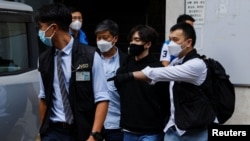Four members of the defunct, pro-democracy, student-activist group, Student Politicism, were sentenced to up to three years in jail or detention Saturday under Hong Kong's national security law.
The activists had pleaded guilty in court in July for a joint count of conspiracy to incite subversion in acts between October 2020 and June 2021.
Group founder Wong Yat Chin was jailed for 36 months and group secretary Chan Chi-sum, was jailed for 34 months, while two spokeswomen for the group were also sentenced. Jessica Chu Wai-ying, 19, received a 30-month prison sentence, while Alice Wong Yuen-lam, 20, was ordered to serve up to three years at a vocational development training center.
Student Politicism was founded in May 2020 and advocated for pressing Hong Kong's “struggle” against the authorities. The group used street booths as a key method to garner support.
But after Beijing imposed the national security law in Hong Kong, activists and civil society groups rapidly began to close, either out of fear of repercussions from enforcement of the security law or because its members already had been charged.
Activists Wong and Chan, both 21 years old, were first arrested for ‘inciting subversion’ on September 20, 2021, and they have remained in custody since then. The following day, Student Politicism was dissolved.
Court allegations
Prosecutors alleged that when the group was active, it attempted to sustain the popular but banned anti-government slogan “Liberate Hong Kong, Revolution of Our Times,” and said the activists called for support of the 12 youths who were arrested by the Chinese coastguard while trying to flee Hong Kong in a speedboat in Taiwan. The group also was accused of encouraging citizens not to download a government COVID-19 contact tracing app.
District court judge Kwok Wai-kin — who is one of the hand-picked judges to rule over national security cases — handed down the sentences. In his judgement, Kwok noted that because members of the group made few public statements and didn’t use much social media, their punishment warranted a lighter sentence.
The judge had been comparing the case of Ma Chun-man, nicknamed "Captain America," who was sentenced last year to nearly six years in prison for promoting Hong Kong independence.
Conspiracy to incite subversion is punishable by up to seven years in prison in Hong Kong’s district courts.
Chilling effect
Michael Mo, a former Hong Kong district councilor who is currently in Britain, said Judge Kwok set a “disturbing precedent” with the sentencing.
“He reinforced that posting political messages on social media would incite more people than on the streets, and mere posting of political views on social could make the nature of the so-called subversion severe, as defined by the National Security Law. It simply tells everyone in Hong Kong to voice no dissent against the regime on social media, or one would just be treated like the four students in this case.
"The fact that all defendants were remanded for over a year for a ‘speech crime’ before trial makes the chilling effect more chilling,” Mo noted.
At the start of 2021, things were different for Wong Yat Chin. He was one of the last remaining well-known activists in Hong Kong that hadn’t been charged by authorities following a massive crackdown on pro-democracy activists and the media.
The signs were growing, though, that he eventually would face charges. Wong had been arrested a couple of times in 2020 for unlawful assembly before he was warned about his activism by national security authorities.
Wong told VOA in January 2021 that authorities in mainland China also visited his family and warned them about his dissent.
Intensifying crackdown
Then in June, Wong was arrested by authorities in Hong Kong’s Victoria Park when he mourned the 1989 Tiananmen Square crackdown in Beijing. The annual event in Hong Kong lasted for more than 30 years before authorities banned the mass gathering, citing the pandemic.
Kacey Wong, a visual artist, and activist from Hong Kong, who last year relocated to Taiwan, said the national security law is intended to spread fear among the younger generation of Hong Kong.
“I think the sentencing is totally unfair, which we can clearly see how the law has transformed into a weapon against the youth, to intimidate and to spread fear among them. The court message is that if you dare to revolt against us, we will lock you up indefinitely, [and] disregard what you have actually done,” Wong told VOA.
Following the widespread anti-government protests three years ago, Beijing enacted the national security law in Hong Kong to prevent political dissent in the city, allowing authorities to use the law to target dissidents. The legislation prohibits acts deemed as secession, subversion, foreign collusion, and terrorism, which carries a maximum punishment of life in prison.
As it stands, at least 130 people have been charged under the law, with dozens still in pretrial custody. More than 20 others have been sentenced to prison.







